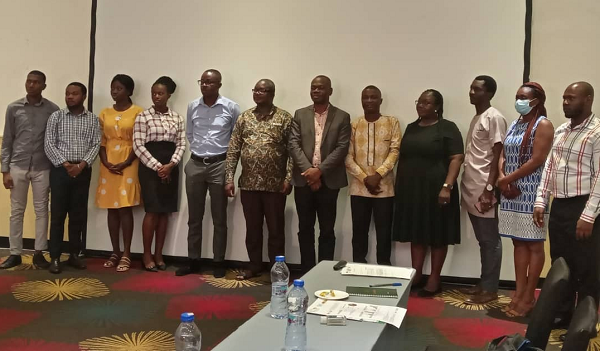
Cowpea production decreasing in Ghana due to pests - SARI
Cowpea production rate and planted area have declined over the past 10 years in Ghana due to pest infestation, Dr Jerry Nboyine of CSIR-Savanna Agriculture Research Institute (SARI), has disclosed.
According to him, pest infestation has discouraged many cowpea farmers from farming the crop in the country, noting that pest infestation has made cowpea farming highly unattractive and also highly costly, hence many cowpea farmers turning their focus on other crops.
Dr Jerry Nboyine said this in an interview with Graphic Online on the sidelines of one-day sensitisation workshop organised by OFAB-Ghana chapter for some staff of the National Development Planning Commission (NDPC) in Accra on April 11, 2022.
The purpose of the workshop was to bring clarity on Genetically Modified (GM) technology activities in Ghana and the status of work done on a GM product—Pod Borer Resistant (PBR) cowpea within CSIR in Ghana.
Dr Nboyine, who is an expert in cowpea breeding said because of pests, when farmers planted cowpea, “they need to spend a lot to buy chemicals to spray” and that “even when farmers are able to afford the chemicals, labour to spray the chemicals all go against them.”
Speaking on the topic: “The story so far: processes of development and status of PBR cowpea in Ghana,” he noted that the cost of production for cowpea was much higher than many other crops due to pests and pointed that many cowpea farmers are now farming maize.
He explained, for instance, that in some cowpea farming communities he visited in the Savelugu Municipality in the Northern region, almost half of the farmers have stopped cultivating cowpea.
Dr Nboyine added that in some communities, the farmers have stopped cultivating cowpea entirely, describing the situation as worrying and needed to be addressed urgently.
For him, the situation whereby cowpea farmers are leaving the sector to farm other crops would mean that government would have to spend more money to import more cowpea into the country.
He said one of the ways to help address the pest infestation on cowpea was for farmers to adopt varieties that were resistant to pests.
He explained that considering the fact that cowpea was highly susceptible to pest infestation, farmers could no longer continue to adopt conventional farming methods to control the pests.
For Dr Nboyine, cowpea farmers can lose up to 90 percent of their crops to the pod borer (Maruca vitrata) pest and typically apply pesticides six or seven times within a planting season in an attempt to control the destructive insect.
He said scientists have developed the pod borer-resistant (PBR) variety to help fight the maruca vitrata pest that destroys the crop at all stages of its development.
He noted that with the PBR cowpea, the maruca pest can no longer attack the crop, stressing that the Bt Cowpea also helps to increase yields.
Dr Nboyine said although farmers were eager to have the Bt cowpea, there were still regulatory challenges that needed to be addressed so that scientists can release the seeds to farmers for planting.
He, however, expressed the hope that if all things go as planned, environmental release of the Bt cowpea seeds will take place in the next two years in the country.
